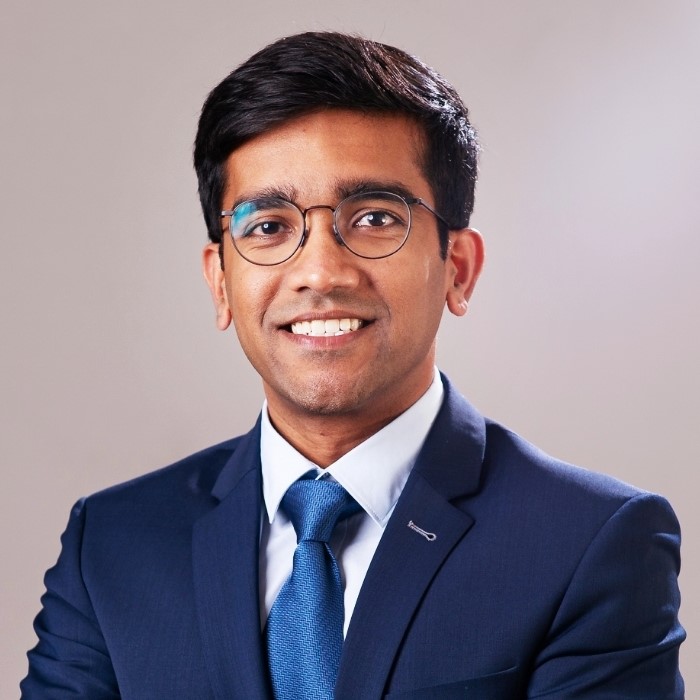dr. R.T. Rajan
Signal Processing Systems (SPS), Department of Microelectronics
PhD thesis (Oct 2016): Relative Space-Time Kinematics of an Anchorless Network
Promotor: Alle-Jan van der Veen
Expertise: statistical machine learning, PNT, multi-agent systems, space systems
Themes: Distributed autonomous sensing systems, Signal processing for communicationBiography
Dr. Raj Thilak Rajan (S'11-M'17-SM'22) is an associate professor with the Signal Processing Systems (SPS) group, the Master Coordinator of the Signals and Systems track (MS-EE-S&S, MS-EE-SNS) and is the Co-director of the Delft Sensor AI Lab. He received his Ph.D. in 2016 from TUD, and obtained his M.Sc. (class first, youngest in class) and B.Sc. (with distinction) in Electronic sciences from University of Pune, India. Raj is an IEEE Senior member, the Vice chair of the IEEE ASI (Autonomous Systems Initiative) and a member of various International Astronomical Federation (IAF) committees. He is an Associate Editor for the IEEE Open Journal of Signal Processing (IEEE-OJSP), and is a reviewer for various related journals and conferences. His research interests lie in statistical machine learning and optimization, with applications to Position Navigation and Timing (PNT) for distributed autonomous sensing systems i.e., swarms.
Previously, he held research positions with diverse responsibilities at IMEC (Eindhoven, 2015-2018), University of Twente (Enschede, 2014-2015) and ASTRON (Dwingeloo, 2008-2014). He was a SSPF fellow (The Netherlands, 2019), INFN fellow (Italy, 2008), MIUR fellow (Italy, 2007), TIFR-VSRP fellow (India, 2005), and is an alumnus of the SSP2019 program from the international space university (ISU). He obtained his University Teaching Qualification (UTQ/BKO) diploma in 2021.
If you are interested in collaborating on relevant topics, then I look forward to hearing from you. PhD aspirants and enthusiastic master thesis students are encouraged to write to me with a (a) your interests+passion (b) resume and (c) a brief proposal (not for master students). There are numerous internships and thesis oppurtunities with other companies and institutes. If you are already pursuing a thesis/internship/extra-project with me, then you can find guidelines here
EE4540 Distributed signal processing
Signal processing techniques for decentralized signal processing
EE4760 Probablistic sensor fusion
EE4C03 Statistical digital signal processing
A second course on digital signal processing: random signals, covariances, linear prediction, spectrum estimation, optimal filtering, Wiener and Kalman filters, LMS and RLS algorithm
ET4386 Estimation and detection
Basics of detection and estimation theory, as used in statistical signal processing, adaptive beamforming, speech enhancement, radar, telecommunication, localization, system identification, and elsewhere.
Education history
EE3350TU Introduction to Radio Astronomy
(not running) Introduction to the science and technology of radio astronomy
AQUAFIND
Distributed localisation and formation control of drones
ShapeFuture
Robust inference and decision making for automated vehicles.
Reliable POwerDown for Industrial Drives
The pioneering EU research project R-PODID started on the 1st of September 2023. This KDT JU co-funded project aims to develop an automated, cloudless, short-term fault-prediction for electric drives, power modules, and power devices, that can be integrated into power converters.
Moonshot
Science, technology and Social solutions for Lunar missions
Delft Sensor AI Lab
Bringing AI to sensor networks
Cooperative Relative Navigation of Multi-agent Systems
Develop algorithms for multi-target position, time and orientation tracking in a mobile network of multi-agent systems
Projects history
Airborne data collection on resilient system architectures
Develop algorithms to realize efficient, robust, cost-effective perception and control for autonomous navigation of drones
PIPP OLFAR: Breakthrough technologies for Interferometry in Space
Combine multiple satellites into one single scientific instrument: a radio telescope in space
Low-frequency distributed radio telescope in space
Below 15 MHz, the ionosphere blocks EM signals from the sky. Therefore, can we design a radio telescope in space, using a swarm of inexpensive nano-satellites? Accurate localization and clock recovery is important.
Last updated: 8 Feb 2026

Raj Thilak Rajan
- +31-15 27 82006
- r.t.rajan@tudelft.nl
- Room: HB 17.070
- Personal webpage
- Google Scholar profile
PhD students
MSc students
- Josephine King
- Hongyu Zhou
- Jelena Pešić
- Gijs Zijderveld
- Alexander James Becoy
Alumni
- Yogesh Prasanna Kumar Rao (2025)
- Barry Tee (2025)
- Yi Dai (2025)
- Shaan Hossain (2025)
- Ibrahim Hassan (2024)
- Srikar Chaganti (2024)
- Srikar Chaganti (MS3) (2024)
- Anitha Koshy (2024)
- Luke Rijk de Waal (2024)
- Xi Chen (2024)
- Ban Hanyuan (2023)
- Haobo Wang (2023)
- Lan Jia (2023)
- Vishakha Marathe (2023)
- Xuchang Zhang (2023)
- Thomas Manteaux (2023)
- Lars Gelling (ELCA) (2023)
- Siddhy Ganesh Shetty (2022)
- Xuzhou Yang (2022)
- Zhonggang Li (2022)
- Peiyuan Zhai (2022)
- Mosab Diab (2022)
- Rui Tang (2022)
- Calum Turner (2021)
- Tanmay Manjunath (2021)
- Bichi Zhang (2021)
- Felix Abel (2021)
- Elke Salzmann (2021)
- Martijn van der Marel (2021)
- Yikai Zeng (2020)